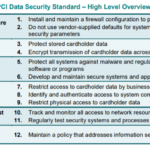In today’s increasingly digital world, small businesses are faced with the daunting task of choosing the best antivirus software that meets their specific needs and budget constraints. With cybersecurity threats on the rise, it is crucial for businesses to protect their sensitive data and information from malicious attacks. However, navigating through the various options available can be overwhelming. This article aims to provide small businesses with a clear roadmap to selecting the best antivirus software that not only fits their unique requirements but also suits their financial limitations. Discover the key factors to consider, such as features, compatibility, customer support, and pricing, to ensure your business is equipped with the right defense against cyber threats.

Understanding the Importance of Antivirus Software
In today’s digital age, where businesses heavily rely on computers and the internet, it is crucial to understand the importance of antivirus software. Antivirus software plays a critical role in protecting your digital assets from various cyber threats. These threats can include viruses, malware, spyware, and ransomware, which can wreak havoc on your systems and compromise the security of your sensitive data.
Recognizing the potential risks from these viruses and malware is essential. Cybercriminals are constantly evolving, coming up with new techniques to infiltrate and exploit vulnerabilities in your systems. These malicious programs can result in data breaches, financial loss, damage to your reputation, and even legal consequences. Therefore, it is vital to take proactive measures and invest in robust antivirus software to safeguard your business operations.
Moreover, acknowledging the financial and operational impacts of cyber threats is crucial. A successful cyberattack can have severe consequences for your business, ranging from financial loss due to stolen funds or disrupted operations, to loss of customer trust and loyalty. The aftermath of such an incident can be time-consuming and expensive to recover from. Therefore, investing in a reliable antivirus software solution is a proactive approach to avoiding these potential risks and minimizing the impact of cyber threats on your business.
Determining Your Specific Needs
When choosing antivirus software for your small business, it is essential to assess your specific needs and requirements. Identify your hardware and operating systems to ensure compatibility with the antivirus software. Different antivirus solutions may have specific system requirements, so it is crucial to select a software that can integrate seamlessly into your existing infrastructure.
Your internet usage and potential vulnerability points also play a significant role in determining your antivirus software needs. If your business relies heavily on online transactions or handles sensitive customer information, you may need a more advanced antivirus solution with features such as real-time scanning and web protection. Understanding your financial transactions and data processing requirements will help you select a software that can provide adequate protection for your business activities.
In addition, assessing the need for mobile protection is becoming increasingly important. With the rise of mobile devices in the workplace, it is crucial to choose an antivirus software solution that can safeguard not only your computers but also your smartphones and tablets. Mobile devices are just as susceptible to cyber threats, so ensuring comprehensive protection across all endpoints is essential in today’s interconnected world.
Evaluating Your Budget for Antivirus Software
Determining your budget for antivirus software is a crucial step in selecting the best solution for your small business. Antivirus software costs can vary significantly, depending on the features and level of protection offered. It is important to allocate a budget that aligns with your business requirements and financial capabilities.
While there are free antivirus options available, it is important to consider the implications of using such software. Free antivirus software may offer limited protection and may not have the same level of features and support as their paid counterparts. It is essential to understand the potential limitations and evaluate whether the free software can adequately meet your needs.
However, opting for a paid antivirus software solution often provides added benefits and peace of mind. Paid antivirus software typically offers more comprehensive protection, advanced features, regular updates, and dedicated customer support. Depending on your business needs, investing in a paid antivirus solution may be a worthwhile investment to ensure robust security and protection for your digital assets.
Furthermore, it is worth exploring value-added packages and enterprise solutions that antivirus software vendors offer. Some software solutions may include additional features like VPN (Virtual Private Network) services, password managers, and parental controls. Assessing the value-add of these features and how they align with your business needs can provide you with a holistic solution that goes beyond basic antivirus protection.
Highlighting Key Features of Antivirus Software
When evaluating antivirus software options, it is essential to understand the key features offered by different solutions. Basic antivirus protection features typically include real-time scanning, malware detection, and removal. These features form the foundation of any antivirus software and are essential for safeguarding your systems against known and emerging threats.
On top of basic protection, some antivirus software solutions offer advanced features such as firewall and spam protection. A firewall acts as a barrier between your business network and the outside world, monitoring and controlling incoming and outgoing network traffic. Spam protection filters out unwanted and potentially harmful emails, reducing the risk of falling victim to phishing attempts or malware-laden attachments.
Additionally, it is worth reviewing additional benefits that antivirus software may provide. Some solutions offer built-in VPN services, allowing you to browse the internet securely and anonymously. Password managers can help you securely store and generate strong passwords, reducing the risk of password-related vulnerabilities. Parental controls are also useful for businesses that have employees with children, allowing you to manage and restrict access to certain websites and content.
By understanding the key features offered by different antivirus software solutions, you can select a product that aligns with your specific needs and provides comprehensive protection for your business.
Comparing Different Antivirus Software
When choosing the best antivirus software for your small business, it is helpful to review top-recommended options for small businesses. Conducting thorough research and comparing features, compatibility, and customer reviews can provide valuable insights into the strengths and weaknesses of different antivirus solutions.
Start by researching reputable antivirus software providers and read reviews from other small business owners who have used these products. Look for software solutions that have consistently positive reviews and testimonials, indicating a high level of customer satisfaction and reliability.
Additionally, take into account compatibility with your existing systems and infrastructure. Ensure that the antivirus software you choose is compatible with your hardware, operating systems, and any other security tools you have in place. Incompatibility issues can result in inefficiencies and potential vulnerabilities in your security posture.
Furthermore, consider any awards or recognition that antivirus software has received. Awards from trusted organizations, such as independent testing labs and industry associations, can provide an indication of the software’s effectiveness and reliability. Recognized antivirus solutions often undergo rigorous testing to evaluate their performance and detection rates, making them a reliable choice for small businesses.
Looking at Customer Support and Assistance
In the event of a cyber threat or technical issue, reliable customer support is crucial for small businesses. Ensure that the antivirus software provider offers 24/7 customer support, allowing you to access assistance whenever you encounter a problem or need guidance.
Evaluate the availability of online resources and self-help options provided by the antivirus software vendor. Knowledge bases, FAQs, and user forums can be valuable sources of information when troubleshooting common issues or seeking guidance on software features and settings.
Furthermore, consider the availability of community support and technical assistance. Some antivirus software providers have active user communities that share insights, tips, and solutions to common problems. Engaging with a supportive community can provide additional resources and a sense of camaraderie among small business owners facing similar security challenges.
Considering Software Usability and Easy Interface
When selecting antivirus software for your small business, assess the software’s usability and ease of interface. A user-friendly interface can significantly impact your experience with the software and the ease with which you can manage and navigate its features and settings.
Consider how intuitive the software interface is and whether it offers a straightforward setup and configuration process. Look for features that simplify the management and monitoring of security settings and allow you to perform regular system scans and updates with ease.
Additionally, check whether the antivirus software is compatible with your current systems and infrastructure. Integration issues can result in difficulties managing and maintaining the software, affecting its overall effectiveness. Ensure that the software seamlessly integrates with your existing tools and platforms to avoid any disruptions or compatibility issues.
Lastly, consider whether the software provides automatic updates and how frequently these updates are released. Regular updates are crucial for staying protected against emerging threats, as new viruses and malware are constantly being developed. Automatic updates ensure that your systems are continuously protected without requiring manual intervention.
Checking Compatibility with Other Security Tools
Antivirus software is an essential element of your overall security strategy, and it is important to consider its compatibility with other security tools. Many businesses utilize additional security solutions such as virtual private networks (VPNs), firewalls, and encryption software to enhance their protection against cyber threats.
Integrating antivirus software with other security solutions is crucial for maximizing your overall security posture. Evaluate whether the antivirus software you are considering is compatible with your existing security tools and whether it can work seamlessly alongside them. Incompatibility issues can result in conflicting settings or reduced effectiveness, compromising your overall security.
Additionally, review the potential performance impacts of running multiple security solutions simultaneously. Some antivirus software solutions may have a heavier resource footprint than others, impacting the performance of your systems. It is essential to select antivirus software that strikes the right balance between robust protection and efficient system performance.
Planning for Future Needs and Scalability
While selecting antivirus software for your current needs is essential, it is equally important to consider your future needs and scalability. As your business grows and evolves, your antivirus software requirements may change. It is crucial to select a software solution that can scale with your business and accommodate any future growth or changes.
Check whether the antivirus software allows for adding more devices or upgrading features. Scalable solutions ensure that you can easily expand your protection as your business expands, without the need for significant additional investments or disruptions.
Additionally, understand the process and cost for upgrading or adding more licenses to accommodate your growing needs. Flexibility in scaling your antivirus software can save you time, effort, and resources in the long run, enabling you to seamlessly adapt to your changing business requirements.
Making the Final Decision
Ultimately, choosing the best antivirus software for your small business involves weighing your specific needs against your budget constraints. Consider the features, compatibility, customer support, and overall value provided by different antivirus software solutions.
Take into account the potential cyber threat risks your business faces and the level of protection required to mitigate those risks. Assess the financial and operational impacts of cyber threats to understand the importance of investing in robust security solutions.
By carefully considering these factors and choosing a software solution that provides overall value and robust security protection, you can protect your digital assets and minimize the risk of cyber threats to your small business. Remember, investing in antivirus software is an investment in the future success and security of your business.








[…] solution, consider its threat detection capabilities, real-time protection, automatic updates, compatibility with different devices, user-friendly interface, and cost-effectiveness. Top-rated antivirus solutions like Bitdefender […]